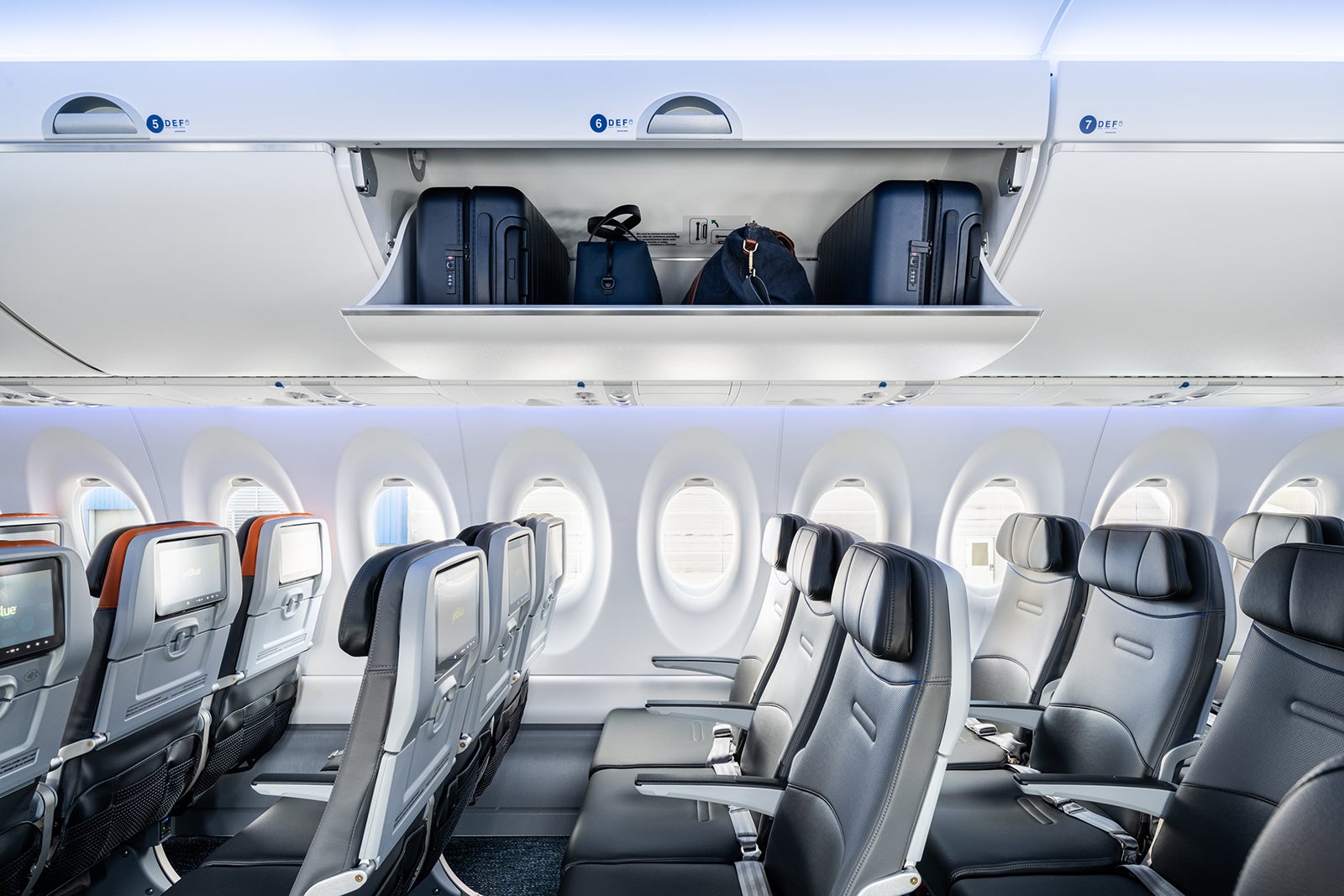Editor’s note: This is a recurring post, regularly updated with new information.
JetBlue Plus Card overview
The JetBlue Plus Card offers a terrific return on airfare spending and comes with a 5,000-point anniversary bonus that covers nearly two-thirds of the card’s $99 annual fee. Benefits such as a free checked baggage allowance, 10% rebate on award redemptions and annual JetBlue Vacations statement credit make this card worthwhile, even for occasional travelers. Card Rating*: ⭐⭐⭐⭐
*Card Rating is based on the opinion of TPG’s editors and is not influenced by the card issuer.
JetBlue’s loyalty program, TrueBlue, tends to fly under the radar, as redemptions are largely restricted to flights operated by JetBlue and Hawaiian Airlines. However, that isn’t necessarily bad if JetBlue is your airline of choice, long known for its customer-friendly experience, superior (and TPG Award-winning) Mint business class and an extensive East Coast and Caribbean route network.
If you are a JetBlue flyer and want to boost your TrueBlue balance or elevate your flying experience with the airline, it makes sense for you to pick up the JetBlue Plus Card. Given its low spending requirement, the card offers several valuable perks that help justify its $99 annual fee.
First, note that you’ll want to have a “good” credit score (670 or above) for the best chances of approval. Now, let’s dig into the card specifics.
The information for the JetBlue Plus Card has been collected independently by The Points Guy. The card details on this page have not been reviewed or provided by the card issuer.
JetBlue Plus Card welcome offer
The JetBlue Plus Card currently offers a welcome bonus of 50,000 points after spending $1,000 on purchases and paying the annual fee in full within the first 90 days. Based on our valuation of 1.4 cents per point, that’s a value of $700. This isn’t the best offer we’ve seen on this card, but it’s not bad either.

In reality, the welcome bonus is worth slightly more since the card offers a rebate on all award bookings, stretching your points further.
Related: Complete guide to the best airline credit cards
JetBlue Plus Card benefits
In addition to a high return on JetBlue spending, there’s a ton of value in the benefits offered by the JetBlue Plus Card. Although the perks mostly revolve around JetBlue, even occasional flyers should be able to take full advantage of them:
- Free first checked bag: Get a first checked bag free for you and up to three companions on the same reservation when you purchase a ticket with your card.
- 5,000-point anniversary bonus: These points are worth about $70 according to our valuations, so without setting foot on a JetBlue plane, you’re covering nearly two-thirds of the card’s $99 annual fee.
- 50% inflight savings: Get 50% back on eligible inflight purchases on JetBlue-operated flights, including alcoholic drinks and Eat Up snack boxes. This discount is applied automatically, generally on the day the charge is posted to your card account.
- Fast-track Mosaic status: Get automatic Mosaic status after spending $50,000 on the card in a calendar year.
- 10% rebate on award flights: When you redeem TrueBlue points for a JetBlue flight, you’ll earn 10% of those points back after you take the flight — which can be used toward your next redemption.
- Points Payback: Allows you to redeem your points for a statement credit, up to $1,000 annually.
- Annual JetBlue Vacations statement credit: Get a $100 statement credit every year with your purchase of a JetBlue Vacations package of $100 or more with your card.
- No foreign transaction fees

Aside from the JetBlue-specific perks, there are general travel and purchase protections, as well as other everyday perks by being a World Elite Mastercard. Here are a few that stand out:
- Trip delay protection: Get up to $300 per trip if your flight is delayed more than six hours (maximum of twice in a 12-month period)
- Trip cancellation and interruption coverage: Get up to $5,000 back in nonrefundable expenses per trip ($10,000 maximum per 12-month period) if you need to cancel or interrupt a trip for a covered reason.
Related: The complete guide to the JetBlue TrueBlue program
Earning points on the JetBlue Plus Card
On the earning side, this card outdoes most cobranded cards from other airlines and even some cards that earn transferable points. With this card, you’ll earn 6 points per dollar on JetBlue purchases, 2 points per dollar at restaurants and grocery stores and 1 point per dollar on all other purchases. As a point of comparison, the no-annual-fee version of this card offers half as many points on JetBlue purchases.

It’s also worth noting that as a TrueBlue member, you’ll earn at least 2 base points per dollar on JetBlue flights booked directly on top of the 6 points per dollar you’ll earn through the card.
Related: How to earn JetBlue TrueBlue points
Redeeming points on the JetBlue Plus Card
The TrueBlue loyalty program is revenue-based, so redemptions are very straightforward. You can redeem points for any seat, including JetBlue Mint seats, on any JetBlue flight across its entire route network and get a fairly consistent value from your points. The more a flight costs in cash, the more it costs in points and vice versa.

For instance, TPG credit card writer Ryan Wilcox takes advantage of JetBlue’s somewhat frequent flash sales. Often, flights start at $20 one-way and can be booked for a measly 400 points. The positive is that you won’t have to worry about scouring for saver award availability. However, it also means there aren’t any major sweet spots for long-haul international first class.
Related: How to maximize your JetBlue TrueBlue points
Transferring points on the JetBlue Plus Card
Although JetBlue — as an airline — partners with a handful of other carriers, Hawaiian Airlines is the only one you can book through the TrueBlue loyalty program. Instead of using the revenue-based base redemption model that ties the award rates to the price of an individual itinerary, however, TrueBlue has a more standard, region-based award chart for these tickets.

To give you a general idea, one-way flights to Hawaii cost 22,000 points from the West Coast and 30,000 points from the East Coast in coach or 45,000 points and 70,000 points, respectively, in first class.
Related: How to maximize 100,000 JetBlue TrueBlue points
Which cards compete with the JetBlue Plus Card?
Here’s a side-by-side look at three of the card’s mid-tier travel competitors:
- If you prefer Capital One: The Capital One Venture Rewards Credit Card provides 5 miles per dollar on hotels and rental cars booked through Capital One Travel and 2 miles per dollar on all purchases for a reasonable $95 annual fee (see rates and fees). For more information, read our full review of the Capital One Venture Rewards Credit Card.
- If you prefer Chase: For a $95 annual fee on the Chase Sapphire Preferred, you’ll earn 5 points per dollar on travel booked through the Chase travel portal, 3 points per dollar on dining, and 2 points per dollar on all travel not booked through the Chase travel portal. For more information, read our full review of the Sapphire Preferred.
- If you prefer Citi: The Citi Premier Card (see rates and fees) has a $95 annual fee and earns 3 points per dollar on air travel, hotels, gas stations, supermarkets and restaurants (including takeout). You’ll also enjoy perks like an $100 annual hotel credit and extended warranty protection. For more information, read our full review of the Citi Premier.
For additional options, check out our full list of the top travel rewards cards.
Related: Chase Sapphire Preferred vs. Citi Premier: Which mid-tier travel card is better?
Is the JetBlue Plus Card worth it?
No other mid-tier cards come close to the JetBlue Plus Card when it comes to return on JetBlue spending or benefits. However, those who aren’t able to fly JetBlue regularly may not get enough value from this card to justify the annual fee.
Related: The best credit cards with annual fees under $100
Bottom line
Even if you only fly JetBlue occasionally, you’ll make up for two-thirds of the JetBlue Plus Card’s annual fee by taking advantage of the 5,000-point anniversary bonus alone. With the additional JetBlue perks like the free checked bag, points rebate and inflight purchase savings, JetBlue flyers will almost certainly benefit from this card.
However, if you don’t think you would benefit from the higher earning rate or p, perks such as the free checked baggage allowance, you might want to stick to the no-annual-fee JetBlue Card.
Related: Why the JetBlue Plus Card remains firmly in my wallet




